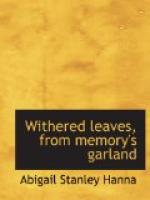But wander on; the sculptured stone
In thunder tones is speaking
here;
The name—the age—it
loudly tells,
To eye and heart, if not the
ear.
They sleep when winter’s winds are
loud,
And snow and sleet come drifting
by;
And when light sails the rosy cloud,
And Spring’s sweet gales
around them sigh.
They sleep—ah, yes—that
dreamless sleep,
That never shall know waking
more;
They’ve cross’d the icy steam
of death,
And pass’d unto the
viewless shore.
Conscience.
Conscience, and what is conscience? Is it not that silent but powerful monitor within that weighs our every motive? is it not the small still voice that whispers its approval when we have acted right, but bursts like the crashing thunder peal or the terrific earthquake, when we have acted wrong? She stands with extended finger a silent though faithful friend, and points us onward in the plain path of duty. We have only to follow her dictates, and all will be well. But many gaudy flowers are blooming here and there beside the path, to tempt the thoughtless one to step aside and pluck; but though they are beautiful to the eye, and their fragrance borne to us by the breeze, seems to woo us temptingly, yet, concealed within their leaves is a deadly scorpion or poisonous asp, whose sting is instant death, or some, perhaps, contain a more slow and sluggish poison, that creeps into the mind, and instilling its venom by slow degrees, corrupts the whole. Conscience has well been called the tell tale of our breasts.
How does it harrow up the mind at the still hours of midnight, when all nature sleeps around, and depict crimes that no eye has witnessed but God and their perpetrators; how does the murderer toss from side to side beneath her lash, and see his victim for the thousandth time in the agonies of death; over and over again, she acts the bloody scene, and, while he turns restless and feverish upon his pillow, still holds the picture bleeding fresh to fancy’s wearied gaze, and as in Macbeth, presents the dagger, while “on its blade and bludgeon are drops of blood that were not so before.” Crimes of dye not so deep, are conjured up to harrow up the breast and rack the brain, and render the victim of a disapproving conscience a miserable wretch indeed.
Truly she is placed within us as a friend, warning us of danger and pressaging good. If we would listen to her dictates, we must be happy, for she never argues wrong. And superlatively happy are they who can lay calmly down on the bed of death cheered by her approving smiles, for a “death bed is a detector of the heart;” here tired dissimulation drops the mark that through life’s grimace has kept up the scene.
Lines, Written in an Album.
The autumn winds are sighing loud,
And wither’d leaves
come flitting by,
And slowly sails the gath’ring cloud,
Across the bleak November
sky.




